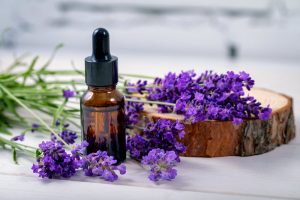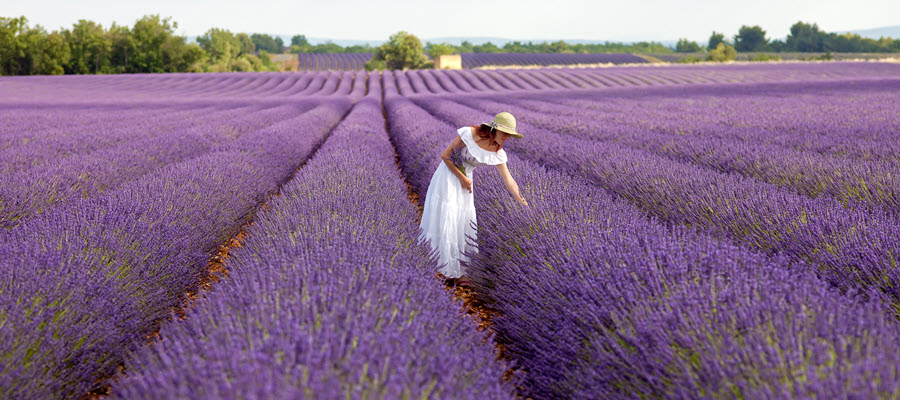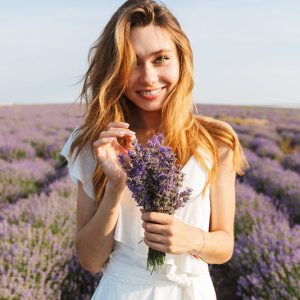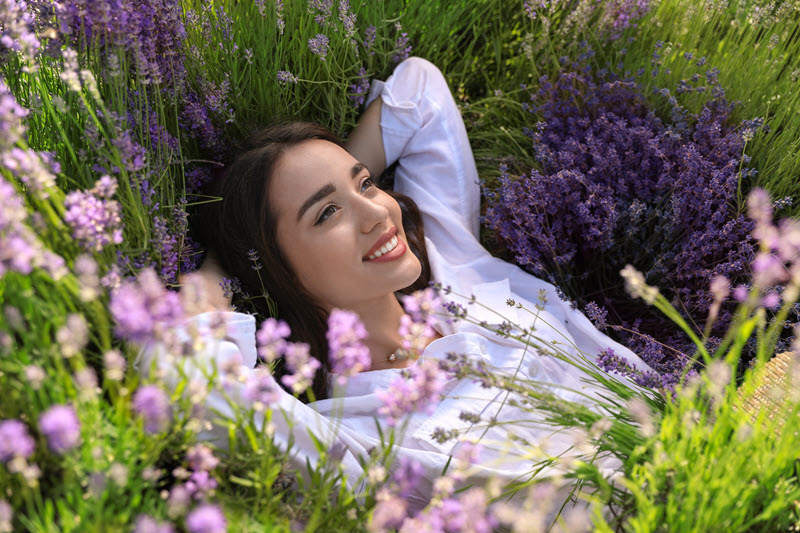Table of Contents
Lavender is known for improving sleep quality, reducing anxiety, and improving mood
Lavender (L. angustifolia, English Lavender) is an herb of the mint family that is used primarily for its anti-anxiety and antidepressant benefits. And for better sleep.
Lavender was used thousands of years ago by the Romans as a natural antiseptic, to dress battle wounds, to repel insects, to cook, and for bathing.
Lavender was used in Medieval times as a perfume. And Queen Elizabeth 1 used it as a perfume, and in her tea for migraine headaches.
Today, Lavender Oil and its extract is used to promote quality sleep, reduce pain, control blood pressure and heart rate, reduce menopausal hot flashes, alleviate fungus growth, boost hair growth, and for anxiety and depression.
In this review we’ll look deeper into how Lavender works in your brain. And why you may want to add this herb to your nootropic stack.
Lavender as a nootropic helps:
- Neurotransmitters – Lavender increases the density of 5-HT1a receptors and reduces their binding potential, which leads to increases in extracellular serotonin, dopamine and norepinephrine. Similar to many antidepressants.[i]
- Brain Waves – Lavender oil increases the power of theta (4-8 Hz) and alpha (8-13 Hz) brain waves. Resulting in feelings of active relaxation.[ii]
- Anxiety & depression – several studies in animals and humans demonstrate the benefits of using Lavender for treating anxiety and depression.[iii]
What is Lavender?
Lavender (L. angustifolia, L. vera, L. officinalis) is a flowering plant with fragrant purple blossoms and native to areas surrounding the Mediterranean Sea, and southern Europe.
 The genus Lavandula also includes varieties found in North and East Africa, the Middle East, and SW Asia and SE India.
The genus Lavandula also includes varieties found in North and East Africa, the Middle East, and SW Asia and SE India.
Lavender gets its name from the Latin ‘lavare’ meaning ‘to wash’. The ancient Romans used Lavender to perfume their baths, beds, clothes, and hair. And used when embalming their dead.
The ancient Greeks named Lavender ‘Nardus’ after the Syrian city Naarda and at the time was called “Nard”. This ‘holy herb’ was used to prepare ‘spikenard’ which is mentioned in the Song of Solomon.
Other forms of lavender include French lavender (L. stoechas) with greenish-gray leaves and has a very strong odor. And Mediterranean Lavender (L. latifolia) is sometimes crossed with L angustifolia and this combo is called L. Intermedia. These various lavenders all share similar chemical compounds.[iv]
The main compounds found in Lavender include linalool, linalyl acetate, 1,8-cineole B-ocimene, terpinen-4-ol, and camphor.
Lavender oil is produced by steam distillation and its major components linalool and linalyl acetate are used in aromatherapy.[v]
Lavender has traditionally been used for relaxation, insect bites, spasms, as an anxiolytic, mood stabilizer, sedative, analgesic, an anticonvulsant, and neuroprotectant.
Some ancient physicians such as Avicenna (980 –1037 AD) and Razi prescribed Lavender for epilepsy, migraine headaches, pain, and tremor.[vi]
Lavender as a nootropic supplement and Lavender essential oil is now used for reducing the symptoms of anxiety, social anxiety, depression and insomnia.
Lavender is also used as an essential oil, in skincare products, and as a natural insect repellant.
The rest of this review investigates using Lavender as a nootropic supplement.
 How does Lavender work in the brain?
How does Lavender work in the brain?
Lavender supports brain health and cognition in several ways. But two in particular stand out.
- Lavender for stress and anxiety. Two of the primary active compounds found in Lavender include linalool and linalyl acetate. Which interact with GABA receptors. Lavender acts on the same GABAa benzodiazepine receptor as popular anti-anxiety drugs such as Diazepam.[vii] The benefit of using Lavender over benzos is the same anti-anxiety benefit but without the sedative and other side effects when using these drugs.
Lavender also influences serotonin and dopamine in your brain, which also regulate mood and cognitive functions.[viii]
- Lavender for sleep. The American Academy of Sleep Medicine identifies non-rapid eye movement Stage 1, Stage 2, Stage 3, and rapid eye movement (REM) as the different sleep stage cycles.
Stage 1 and 2 and REM sleep are regarded as light sleep where it’s easy to wake up. Stage 3 is dominated by Delta brain waves or “slow wave” sleep which is usually good sleep quality.
Slow wave sleep is also critical for cerebrospinal fluid flow and removal of toxic materials from your brain.[ix] Research shows inhaling Lavender aroma before sleep could increase slow wave sleep for better sleep quality.[x]
In one study, 9 young adults participated and were put into a room in which researchers released lavender oil aroma without the participants knowledge.
The analysis showed lavender oil decreased alpha brain wave activity and increased delta brain wave activity. The researchers concluded that “these results suggest that the improved sleep quality is directly linked to aroma” of lavender oil.[xi]
Lavender benefits
 Lavender is an effective method for reducing anxiety. This herb influences benzodiazepine receptors. Lavender has a similar function to benzos and increases GABA in the amygdala.[xii]
Lavender is an effective method for reducing anxiety. This herb influences benzodiazepine receptors. Lavender has a similar function to benzos and increases GABA in the amygdala.[xii]
Adding Lavender Oil extract to your nootropic stack may improve sleep, and help you feel awake and refreshed the next day.
Lavender may help reduce the symptoms of depression.
Lavender may help with pain management and wound healing. Lavender oil is shown in increase collagen production when applied to your skin.[xiii]
How does Lavender feel?
Many report supplementing with Lavender is comparable to using anti-anxiety meds such as Lorazepam, Valium or Xanax. Without feeling ‘drugged’.
Others say Lavender helped with social anxiety, less irritability, it was easier to focus, and it helped keep their blood pressure down.
Lavender is often used for better and deeper sleep. And waking up feeling refreshed and ready to start their day.
Supplementing with Lavender should help keep you calm without making you sleepy during the day.
Lavender has also been reported to relieve the severity and frequency of migraine headaches.
 Lavender Clinical Research
Lavender Clinical Research
Lavender for Anxiety
Lavender has been used to reduce anxiety for centuries. And recent clinical studies now demonstrate how this herb works to reduce stress.
A double-blind, randomized phase III study was conducted in Germany with 77 patients diagnosed with anxiety. 59 patients were men and 18 were women.
40- patients supplemented with Silexan®, a patented Lavender extract, daily for 6 weeks. And 37 patients were given lorazepam daily for 6 weeks. The patients were then evaluated using the Hamilton Anxiety Rating Scale.
The study concluded at trial end that Silexan® was as effective in reducing anxiety as lorazepam.
The study authors stated that lavender extract did not produce sedative effects and had no potential for abuse. And Silexan® was an effective and a well-tolerated alternative to benzodiazepines for generalized anxiety.[xiv]
Lavender for depression
A study published in 2024 demonstrated the effectiveness of Lavender for treating depression compared to using a SSRI.
In this study, 498 patients diagnosed with mild to moderate depression participated. 170 patients received a daily dose of 80 mg Silexan®, 171 patients took 50 mg sertraline, and 157 took a placebo for 8 weeks.
The study authors concluded that the magnitude of relief from depression with those supplementing with Lavender was as effective as those who used sertraline.[xv]
Lavender for treating migraines
Migraine headache is reported by the World Health Organization as the sixth most disabling disease worldwide. 17% of women report getting migraines and 6% of men.[xvi]
Symptoms caused by migraines can include nausea, blurred vision, vomiting, sensitivity to light and noise.
Drugs used to treat migraines by mainstream medicine include beta-blockers, topiramate valproate, amitriptyline, venlafaxine, gabapentin, magnesium and botulin toxins. But not all drugs work for everyone and none ‘cure’ migraines.
One study was conducted in Iran to evaluate the efficacy of using Lavender oil for treating migraine headache.
20 female and 10 male patients were in the treatment group and 22 female and 8 male in the control group with an average age of 30 years.
The treatment group received Lavender oil extract, and the control group received a placebo.
At the end of he study, the Lavender treated group had a reduction in headache severity of 41% in the first month and 52% in the second month.
The study authors concluded that the frequency and severity of migraine incidents were reduced with those receiving Lavender therapy.[xvii]
 Lavender Recommended Dosage
Lavender Recommended Dosage
The recommended nootropic dosage for Lavender Oil extract is 80 – 160 mg per day.
Lavender taken before bed may help you sleep, and then provide anxiolytic effects the next day.
When used as aromatherapy, 2 – 3 drops of essential Lavender oil in a diffuser.
When using Lavender Oil as a topical therapy, you may need to dilute it in a carrier oil. Follow the manufacturer’s directions on the label.
A meta-analysis of 40 clinical studies concluded that Lavender aromatherapy is, clinically, superior in short-duration of up to 15 minutes, while Silexan™ (oral lavender) 80 mg is preferable for long-term treatment of anxiety.[xviii]
Lavender Side Effects
 Lavender is usually well-tolerated and safe to use by most people.
Lavender is usually well-tolerated and safe to use by most people.
Side effects are rare but can include upset stomach, belching, diarrhea, heart palpitations, headache, infection, an allergic reaction, or contact dermatitis or eczema.
The most often reported side effect when supplementing with Lavender is burping.
A very few Lavender users report less motivation and energy.
There is very little known about whether Lavender is safe during pregnancy or while breastfeeding.
Lavender may be contraindicated with sedatives, anti-anxiety meds, and other antidepressants, so be careful if you are using any of these medications .
The best type of Lavender to buy
Lavender as a nootropic supplement is available in capsules, tablets, tea, and essential oil.
Always select a Lavender supplement extract this is pure and steam-distilled. Choose organic and pesticide-free and get it from a trustworthy supplier who publishes their testing protocols.
Silexan™ is a steam-distilled Lavender extract manufactured by Dr Willmar Schwabe GmbH & Co. KG, based in Karlsruhe, Germany. The company licenses the extract to other dietary supplement companies.
Lavela WS 1265™ is Silexan™ as an essential oil.
Nootropics Expert® Recommendation
 Lavender extract 80 – 160 mg per day
Lavender extract 80 – 160 mg per day
I recommend Lavender extract as a nootropic supplement.
Your body does not make Lavender on its own. So, to get its benefits you must take it as a supplement.
Lavender is reported to work well as an anti-anxiety supplement. Many say Lavender is as effective as prescription benzos for treating anxiety.
Lavender extract as a supplement or essential oil is said to work well for those suffering from insomnia.
This ancient herb helps relieve the symptoms of depression by acting on dopamine and serotonin pathways. And reducing proinflammatory cytokines which is often found elevated in those with depression.
And Lavender extract has been found to help with learning and memory particularly in those with anxiety. Including social anxiety.
Lavender extract is water soluble so can be taken at any time with a glass of water.







Join The Discussion - 0 comments